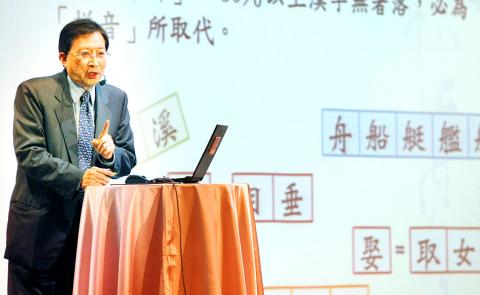President Ma Ying-jeou (馬英九) yesterday applauded the launch of an online cross-strait Chinese dictionary that incorporates a database on the languages used in Taiwan and China, a move to further bilateral cultural exchanges across the Taiwan Strait.
The launch of the online Chinese Language Knowledge Database (中華語文知識庫), compiled by the General Association of -Chinese Culture (GACC), an institution under the Presidential Office, implemented one of Ma’s campaign promises during the 2008 presidential election to establish a cross-strait dictionary and facilitate cross-strait cultural exchanges as people on either side of the Taiwan Strait use different Chinese characters and phrases.
“The best way to handle the differences between traditional and simplified Chinese characters is to list both and explain the -differences. The database will help the two sides understand each other and promote cultural exchanges. There are no political intentions,” Ma said at the launch ceremony.

Photo: CNA
While defending the use of traditional Chinese characters since his two terms as Taipei mayor, Ma said it would be difficult to ask China to adopt traditional characters or for Taiwan to use simplified Mandarin instead.
“What we should do is to understand the different languages and look at the characters from a non-political perspective. Maybe the two sides will develop a new set of characters that can be used and -that would be acceptable across the [Taiwan] Strait,” he said.
GACC chairman Liu Chao-shiuan (劉兆玄) said the database includes a compilation that juxtaposes characters and phrases commonly used by people from both sides of the Strait in their daily lives.
The online platform (chinese--linguipedia.org) can also be operated in a way similar to that of Wikipedia, allowing users to suggest more content or edit posted content after a submission is approved by experts, he said, adding that the association would eventually launch applications to extend the database service to users of smartphones and tablet computers.
The site includes a search -engine that allows users to look up words spoken by people from Taiwan and China. In addition to the definition, it will also show the equivalent used by the other side.
Ma said the database would also help the growing number of people who are learning Mandarin worldwide understand the differences between the languages adopted in Taiwan and China.
One of the examples he gave was the term “playing the trumpet” (吹喇叭), which means “giving someone a blowjob” in Taiwanese slang, but means “fawning over somebody” in China.
Additional reporting by CNA

CHAOS: Iranians took to the streets playing celebratory music after reports of Khamenei’s death on Saturday, while mourners also gathered in Tehran yesterday Iranian Supreme Leader Ayatollah Ali Khamenei was killed in a major attack on Iran launched by Israel and the US, throwing the future of the Islamic republic into doubt and raising the risk of regional instability. Iranian state television and the state-run IRNA news agency announced the 86-year-old’s death early yesterday. US President Donald Trump said it gave Iranians their “greatest chance” to “take back” their country. The announcements came after a joint US and Israeli aerial bombardment that targeted Iranian military and governmental sites. Trump said the “heavy and pinpoint bombing” would continue through the week or as long

TRUST: The KMT said it respected the US’ timing and considerations, and hoped it would continue to honor its commitments to helping Taiwan bolster its defenses and deterrence US President Donald Trump is delaying a multibillion-dollar arms sale to Taiwan to ensure his visit to Beijing is successful, a New York Times report said. The weapons sales package has stalled in the US Department of State, the report said, citing US officials it did not identify. The White House has told agencies not to push forward ahead of Trump’s meeting with Chinese President Xi Jinping (習近平), it said. The two last month held a phone call to discuss trade and geopolitical flashpoints ahead of the summit. Xi raised the Taiwan issue and urged the US to handle arms sales to

State-run CPC Corp, Taiwan (CPC, 台灣中油) yesterday said that it had confirmed on Saturday night with its liquefied natural gas (LNG) and crude oil suppliers that shipments are proceeding as scheduled and that domestic supplies remain unaffected. The CPC yesterday announced the gasoline and diesel prices will rise by NT$0.2 and NT$0.4 per liter, respectively, starting Monday, citing Middle East tensions and blizzards in the eastern United States. CPC also iterated it has been reducing the proportion of crude oil imports from the Middle East and diversifying its supply sources in the past few years in response to geopolitical risks, expanding

Pro-democracy media tycoon Jimmy Lai’s (黎智英) fraud conviction and prison sentence were yesterday overturned by a Hong Kong court, in a surprise legal decision that comes soon after Lai was jailed for 20 years on a separate national security charge. Judges Jeremy Poon (潘兆初), Anthea Pang (彭寶琴) and Derek Pang (彭偉昌) said in the judgement that they allowed the appeal from Lai, and another defendant in the case, to proceed, as a lower court judge had “erred.” “The Court of Appeal gave them leave to appeal against their conviction, allowed their appeals, quashed the convictions and set aside the sentences,” the judges